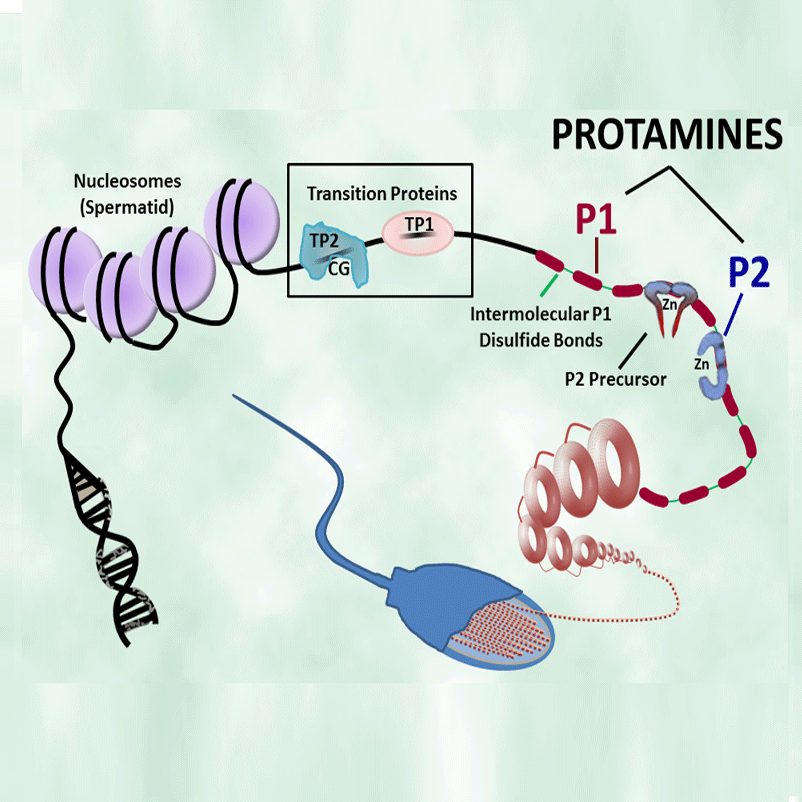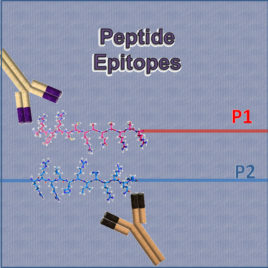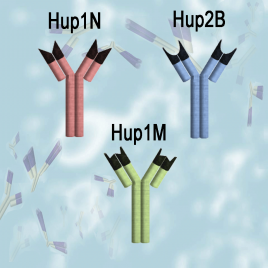Description
Our products are sold for research use only and are not intended for diagnostic or therapeutic use.
Protamines are small, arginine-rich, nuclear proteins that replace histones and transition proteins late in spermiogenesis. They play an important role in spermatid genome inactivation and sperm chromatin condensation and stabilization. Protamine binding to DNA may contribute to the forces that drive nuclear compaction and contribute to head shaping. DNA bound to protamines is much more densely packed than DNA packaged by histones, and the genes associated with protamine can only be expressed when the protamines are removed after fertilization.
Important Note: Protamines are very basic proteins. They are insoluble in SDS and cannont be run on standard SDS gels. Please visit the Useful Information page to find protocols, such as making acid-urea gels.
Native Isolated Mammalian Protamines
Bull (Bos taurus) P1 (MW 6627) is a native protamine that has been isolated from ejaculated sperm. Two forms are available – the native protamine as isolated from sperm and the isolate further purified by HPLC. Bull P1 protamine is recognized by and binds to the Hup1N ~= BPB-20-D4 > BPB-5-D1 ~= BPB-11-C1 antibodies. It does not bind to Hup2B, Hup1M and the other BPB antibodies.
Boar (Sus scrofa) P1 and Ram (Ovis aries) P1 are native protamines that have been isolated from mature sperm. These native P1 molecules are recognized by and bind to the Hup1N antibody. They do not bind to the Hup2B or the Hup1M antibodies. Testing to show binding of the new BPB antibodies to boar and ram protamine P1 has not been done.
Hamster (Mesocricetus auratus) P1 is a native protamine that has been isolated from epididymal (cauda) sperm and then purified by HPLC. Hamster P1 protamine is recognized by and binds to the Hup1N antibody. It does not bind to the Hup2B or the Hup1M antibodies. Testing to show binding of the new BPB antibodies to hamster protamines has not been done.
Hamster (Mesocricetus auratus) P1P2 mix has been isolated from epididymal (cauda) sperm. These native protamines are present in hamster sperm as a mixture (P1: 67% and P2 33%). The hamster P1 and P2 protamines are recognized by the Hup1N and Hup2B antibodies, respectively. Neither protamine binds to the Hup1M antibody. Testing to show binding of the new BPB antibodies to hamster protamines has not been done.
Stallion (Equus caballus) P1P2 mix has been isolated from ejaculated sperm. These native protamines are present in stallion sperm as a mixture (P1: 86% and P2 14%). The stallion P1 protamine is recognized by the BPB-20- D4 (IgG2b) > Hup1N (IgG1) antibodies. Stallion P2 binds to BPB-5 D1 > BPB-11-C1 ~= BPB-20-D4 antibodies, and does not bind to Hup2B or the other Hup and BPB antibodies. Neither stallion protamine binds to the Hup1M antibody.
Human (Homo sapiens) P1P2 mix has been isolated from ejaculated sperm. These native protamines are present in human sperm as a mixture (P1: 50% and P2: 50%). The BPB-18-C10 antibody binds to the native human protamine P1/P2 mix only. The Hup1M antibody is specific for human protamine P1. The human P1 protamine is recognized by BPB antibodies 2-A11, 5-A2, 6-F3, 8-F5, 9-F1, 5-D1, 11-C1 > BPB-26-B11 > Hup1N ~= BPB-20-D4. The human P2 protamine is recognized by the BPB-17-B8 > Hup2B ~= BPB-20-D4 > BPB-26-F6 antibodies.
Synthetic Mammalian Protamines
Human (Homo sapiens) synthetic P1 has been chemically synthesized, HPLC purified and analyzed by mass spectroscopy (95.5% purity, MW 6692.00). The synthetic human P1 is recognized by the BPB antibodies 2-A11, 5-A2, 6-F3, 8-F5, 9-F1, 5-D1, 11-C1 > BPB-26-B11 > Hup1N ~= BPB-20-D4..
Human (Homo sapiens) synthetic P2 has been chemically synthesized, HPLC purified and analyzed by mass spectroscopy (95.2% purity, MW 7655.05). The synthetic human P2 is recognized by the BPB-17-B8 > Hup2B ~= BPB-20-D4 > BPB-26-F6 antibodies.
Mouse (Mus musculus) synthetic P1 has been chemically synthesized, HPLC purified and analyzed by mass spectroscopy (96.7% purity, MW 6827.31). The synthetic mouse P1 is recognized by Hup1N > BPB-20-D4 > 5-D1 > BPB antibodies 2-A11, 5-A2, 6-F3, 8-F5, 9-F1, and 11-C1.
Mouse (Mus musculus) synthetic P2 has been chemically synthesized, HPLC purified and analyzed by mass spectroscopy (95.2% purity, MW 8594.17). The synthetic mouse P2 is recognized by Hup2B > BPB-20-D4 > BPB-26-F6 > BPB-5-D1 ~= BPB11-C1.
Stallion (Equus caballus) synthetic P1 has been chemically synthesized, HPLC purified and analyzed by mass spectroscopy (95.9% purity, MW 6,599.30). It is recognized by BPB-20- D4 (IgG2b) > Hup1N (IgG1) antibodies.
Stallion (Equus caballus) synthetic P2 has been chemically synthesized, HPLC purified and analyzed by mass spectroscopy (77.8% purity, MW 8,040.56). Stallion P2 binds to BPB-5 D1 > BPB-11-C1 ~= BPB-20-D4 antibodies, and does not bind to Hup2B or the other Hup or BPB antibodies.
Concentration
The protamines are dissolved in 100 mM 2-mercaptoethanol and are provided at a concentration of 1.0 mg/ml.
If you need to produce a more concentrated protamine stock solution, one of the following three approaches should work well.
- Transfer the protamine stock solution supplied (1.0 mg/ml) to a small Pyrex or equivalent tube and freeze on dry ice. Lyophilize to remove the solvent. The protein can then be dissolved in distilled water containing 10-100 mM 2-mercaptoethanol (MSH) or 10 mM HCL to the desired concentration.
- Transfer the protamine stock solution supplied (1.0 mg/ml) into a SpeedVac microcentrifuge tube and centrifuge the sample under vacuum in a SpeedVac centrifuge until the desired volume and concentration is reached.
- Mix the protamine stock solution with an equal volume of 40% trichloroacetic acid (TCA) to produce a final TCA concentration of 20% and allow the protein to precipitate on ice for 1 hr. Centrifuge to sediment the precipitated protamine, carefully remove the supernatant, and add 2-3 ml acidified acetone (2 drops 1N HCL added to 10 ml acetone) to rinse the protamine pellet, centrifuge again, carefully remove the supernatant, and repeat the acidified acetone wash twice more. After removing the acetone supernatant the final time, let the protein pellet air-dry. It is important to note that if small amounts of protamine are being precipitated in this manner, the resulting precipitate can be very difficult to see. It may appear as a barely visible white coating or a clear “glass-like” film on the bottom of the tube. The protein can then be dissolved in distilled water containing 10-100 mM 2-mercaptoethanol (MSH) or 10 mM HCL to the desired concentration.
Storage
These proteins can be stored as provided for up to six months at 4-6 °C. If they are to be maintained for longer periods of time, store at -20°C. Protamines stored in the dried state form intramolecular disulfides over time and can become insoluble. The formation of these intermolecular disulfides can be minimized by storing the dried proteins under an inert gas, such as nitrogen or argon. If disulfides form, they can be reduced by adding concentrated 2-mercaptoethanol to the dry protein, allowing reduction of the disulfides to proceed for 30 min, and then adding water to adjust the protein and MSH concentration.



